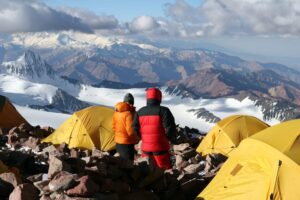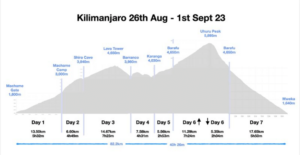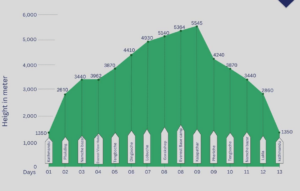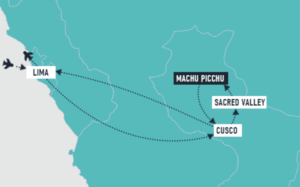Altitude Sickness
When embarking on a trip to high altitudes, it's important to consider Acute Mountain Sickness (AMS) and how to avoid it.

Altitude sickness is the name given to 3 conditions of at altitude, the most well-known of which is Acute Mountain Sickness (AMS).
AMS occurs is some travellers when exceeding 2500m and most travellers exceeding 4500m in altitude. It is caused not by the lack of oxygen in the air but the reduction in air pressure. Air pressure becomes reduced at altitude and taking in enough available oxygen becomes more difficult, so the body tries to compensate. This compensation reduces and limits the amount of activity that can be undertaken and is often associated with severe headaches. At this point in an ascent the traveller needs to rehydrate and rest until the headache goes away, if not then descent to a lower altitude is necessary.
So where do we find such travel trips around the world. Areas of AMS commonly requested for prevention include:

- Kilimanjaro- altitude 5600 metres, ascent time 4-5 days.(see map 1) risk- maximum recommended ascent per day is 500m/day

- Everest Base camp- altitude 5300m, treks take 10-12 days. (see map 2) risk- exceeds 4500m threshold where most people will suffer with AMS

- Flight from Lima to Cusco (visiting Machu Picchu) (-altitude in Lima (150m above sea level), Cusco (3400m above sea level), flight time 2 hours (see map 3a), treks to Machu Picchu (see map 3b) risk- altitude increase greater than 3000m in 2 hours (from Lima to Cusco) and treks along Inca Trail.
The question often asked, is how I know if I am developing AMS? The answer to this was produced in 2018 when a group of medical experts designed a simple scoring sheet called the Lake Louise Scale. This is based on a self-reporting questionnaire recorded every day when at altitude and scores key symptoms. The sum of the scores indicates any changes towards AMS or its severity. This has now become a daily request of some trekking companies organising treks at altitude to complete a scorecard.
Further details can be found here and an example of a ScoreCard
So, I am travelling to high altitude how can I prevent AMS, is a commonly asked question? A few points that should be considered and these are:
- Climb high, camp low- a phrase that supports the need descend to rest (sleep) at an altitude no higher than 500m above the previous night after ascending greater than 500m in the day.
- Slow ascent versus rapid ascent- if possible, choose a route that has slower (longer) ascent than a rapid (fast) ascent, allowing the body to acclimatize to the altitude changes.
- Use the medication acetazolamide.
One of the best preventions is to use a drug called acetazolamide. This drug regulates the body’s breathing allowing more oxygen to be inhaled, it is taken in a tablet form with the dose of half a tablet taken morning and evening.
Acetazolamide can be obtained from CityDoc clinics and pharmacies, and a course will include enough medication for the following:
- 2-day trial in the UK- to ensure there are no side effects
- Start taking 1-2 days before ascent above 2500m
- The total number of days of the ascent to the highest point
- First 2 days of the descent
In this case the acetazolamide is used to prevent AMS, there are other dosages and when used to treat AMS and these should only be used following medical advice.
Alternative medications for AMS can be purchased locally in many countries. The quality, purity and consistency cannot be controlled along with the contents. One example is the use of coca leaf products in South America. These will remove the headache of AMS but do not regulate the breathing which is the cause of the condition. These products are made from the coca plant, a source of cocaine which can be excreted in small quantities through the skin and could cause an issue when passing through border control with drug detection surveillance.
Further Reading:
- Altitude Illness Factsheet https://travelhealthpro.org.uk/factsheet/26/altitude-illness
- Travel at High Altitude- https://www.medex.org.uk/the-medex-book/
Written by Derek Evans FFTM RCPS(Glasgow), FISTM, FRPharmS, FRGS
Travel Health and Vaccination Lead



